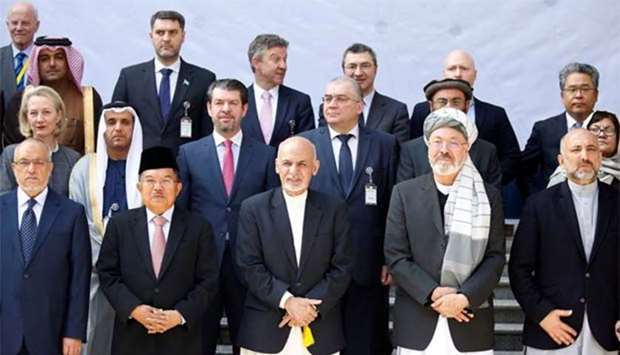Afghan President Ashraf Ghani on Wednesday unveiled a plan to open peace talks with the Taliban, including eventually recognising them as a political party, days after the militants called for direct negotiations with the US.
The apparent openness by both sides to some form of negotiations came as civilian casualties have soared in recent months, with the Taliban increasingly targeting towns and cities in response to a new and more aggressive US military policy ordered by President Donald Trump.Ghani disclosed the framework at the Kabul Process, a regional conference in the Afghan capital focused on bringing peace to the country. He called for a truce, after which the Taliban could become a political party and contest elections.
"A ceasefire should be held, the Taliban should be recognised as a political party and trust-building process should be initiated," said Ghani, in remarks similar to past offers.
"Now the decision is in your hands, accept peace... and let's bring stability to this country," he added.
In return, Ghani said the militants should officially recognise the Afghan government and constitution, a perennial sticking point in past attempts to open talks.
There was no immediate response to Ghani's offer from the Taliban.
However the group's spokesman Zabiullah Mujahid maligned the Kabul Process, tweeting that the conference sought the Taliban's "surrender" at a time when it is "without a doubt a force that has defeated an international arrogant power like America with all its allies and tools at disposal".
His statement was part of a written response from the Taliban to a New Yorker article chronicling efforts towards peace talks by an American expert on Afghanistan, Barnett Rubin.
On Monday the Taliban said it was prepared to enter direct talks with the US to find a "peaceful solution" to more than 16 years of war.
That statement however made no mention of negotiating with the Afghan government -- a condition which the US has long stated is vital to any peace process.
Observers were cautious about the impact of Ghani's proposal, which includes offers previously made to the Taliban -- though this is the first time they have been arranged in a "clean peace plan" and announced at a multi-national conference, noted Afghan political analyst Abdul Bari.
"The timing is important... the Taliban might reject the offer, as they have done in the past, but at least it seems the peace process (which) stopped for a while may get back on track," he told AFP.
Pakistani journalist and Taliban expert Rahimullah Yusufzai said the insurgents' leadership remained committed to the US-only position, but others in the movement were less dogmatic about talking with Kabul.
"There are some people among the Taliban who believe that they will have to negotiate with the Afghan government," said Yusufzai.
He added that the militants have suffered heavy casualties under the new US strategy of increased airstrikes and commando raids.
Despite the losses, Yusufzai said the group would continue the insurgency. "They derive their power from their ability to keep fighting," he said.
Kabul is hosting the second round of the peace conference at which representatives from 25 countries will discuss counter-terrorism and conflict resolution strategies. US officials have described the current situation in the war as a stalemate.
The fighting continued elsewhere in the country Wednesday.
Officials in southern Kandahar and Uruzgan accused the Taliban of attacking a police checkpoint between the two provinces, killing five people and kidnapping at least 19 car passengers.
"We have launched an operation to find them," said Zia Durrani, the Kandahar police spokesman, who blamed the militant group for the attack. Dost Mohammad Nayeb, spokesman for governor of Uruzgan, confirmed the incident.
No group has yet issued any claim of responsibility for the attack.

